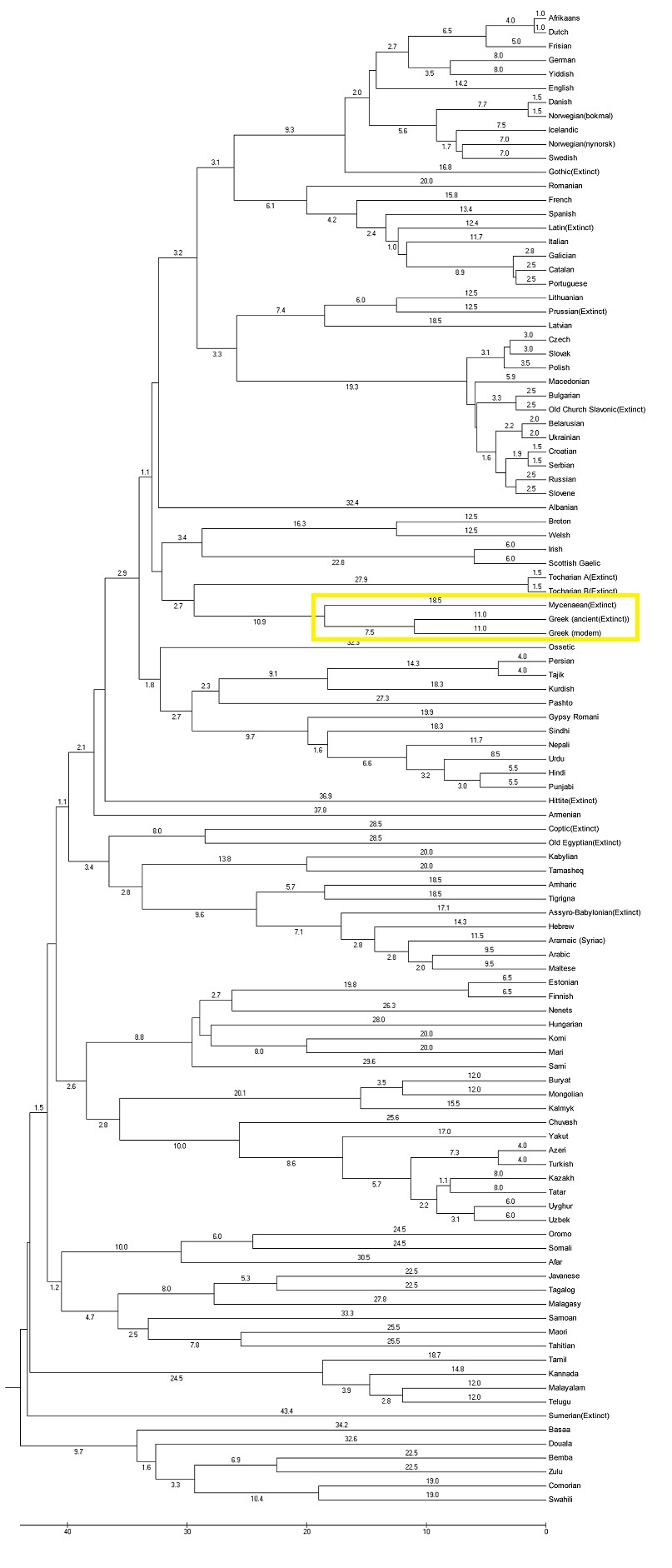| Mycenaean (Linear B Greek) |
|---|
|
Posted by: A.T. on Oct. 2, 2013, 16:24
I have followed the interesting discussion about Ancient Greek vs. Modern Greek in this forum and wondered why you don't try to classify Mycenaean with your system.
|
|
Posted by: Vincent on Oct. 5, 2013, 10:55
Good idea! There are good sources on the Internet with Mycenaean words. Unfortunately, it seems that only four words from this study's basic words list are available from linear B clay tablets. These four words are now coded into the system (try here:
Mycenaean to ancient Greek) : a complete list
of all 18 words is not a condition for processing (the list is also partial in languages like Etruscan and Sumerian). What is amazing is that the results are pretty much that what we could expect: Greek as nearest neightbour and
right position in the tree (I have not updated the main tree - you see the results in the row tree here).I think it is an other confirmation if the system's validity and a proof that the chosen words are really best suited for mass lexical comparison: take 4 words from a 3200 years old language - challenge them in a "E-mass lexical comparison" against 120 languages and get that language classified at the right place...  |
|
Posted by: Bill on Jun. 2, 2021, 02:35
Hello Vincent,I was looking into the genetic distance between Mycenaean and ancient Greek, and I was surprised to see that the distance between the two languages is much greater than the distance between ancient Greek and modern Greek. It looks like Mycenaean is not a Hellenic language at all, but belongs to another Indo-European language group. I tried comparisons with other language groups to find the closest relative. A comparison with Old Church Slavonic showed the smallest genetic distance of the dead languages, and similarities exist with modern Slavic languages as well. The closest relative of all, living or dead, appears to be modern Macedonian, a Slavic language from the areas just north of modern Greece. It would be interesting to see more analysis since the available information on Mycenaean is limited. (For details see the screen shots below.) Is there really a Mycenaean-Slavic language group? Should the language of the ancient Mycenaeans be called Mycenaean Macedonian, not Mycenaean Greek? The Doric migration theory postulates that ancient Greeks migrated into Greece after the time of the Mycenaeans. The linguistic evidence seems to support that theory. What do you think? Bill |
|
Posted by: Vincent on Jun. 6, 2021, 03:07
Hello Bill,
Thank you for your remarks. Generally, the results from the calculator have to be taken with great caution because they expose a big variance. This variance becomes exponentially bigger when fewer words are available, which is the case with Mycenaean. The roots are very stable and comparing Indo-European languages, few differences have a great impact on the results. So, if by chance one language exposes a better score on only one word, it impacts more than 10% of the results when only 9 words are available for the comparison. In the data, the Macedonian language in use is the modern, Slavic one, which has nothing to do with the historical Macedonians referred in the Greek history (this is why there is still a dispute today regarding the use of the word "Macedonian" by the ex Yugoslav republic). Mycenaean is related to all Indo-European languages and has better scores toward Slavic languages in the system. Indeed, it is not logical that these scores are equal or better than towards the Greek languages (Greek ancient and modern + Tsakonian). The better results we get for Mycenaean is an outlier. Another outlier (on the other side!) is Mycenaean-Persian with 94,4: Persian is Indo-European and is definitely related to Mycenaean just as other IE languages are. A few interesting comparison from Mycenaean to Greek (ancient and modern) as well as Tsakonian: Mycenaean to ancient Greek comparison Mycenaean to modern Greek comparison Mycenaean to Tsakonian comparison Kind regards Vincent |
|
Posted by: A.T. on Jun. 15, 2021, 15:26
Hello Vincent,
Thank you for your reply to my speculations. Here are few comments: 1) Even with the limited information, the distance between Mycenaean and Ancient Greek is very large (55) and seems hard reconcile with a gradual evolution of the language. The distance is far greater than that between Old English and Modern English or Latin and Italian for example. The distance appears to be similar to that between Gaulish and Latin or perhaps Ancient British and Old English, which correspond to one language being replaced with another distantly related language. Another possibility is that Ancient Greek developed as from interactions between Mycenaean and unrelated language(s) as has happened with French creoles. 2) I agree that the relation between Mycenaean and non-Greek Indo-European languages is speculation given the small sample of Mycenaean and the uncertainties related to interpreting its writing system. Perhaps future discoveries will clarify the situation. 3) As far as the ancient Macedonian language, my understanding is that the available information is extremely limited and much of it comes from a few words recorded by writers in ancient Greek. Is it possible that Mycenaean may be much closer to ancient Macedonian that it is to ancient Greek? 4) Yes, the apparent close relation between Mycenaean and modern Macedonia is probably just a matter of luck based on the limited sample size. On the other hand, is it possible that modern Macedonian was influenced by a substrate of ancient Macedonian? Church Slavonic was the literary language of Macedonia during most of the Byzantine and Ottoman empires, so the local spoken dialects were not recorded until very recently. Given the highly charged politics of the region and limited historical evidence, that question may never see a conclusive answer. Bill |
Forum » Mycenaean
